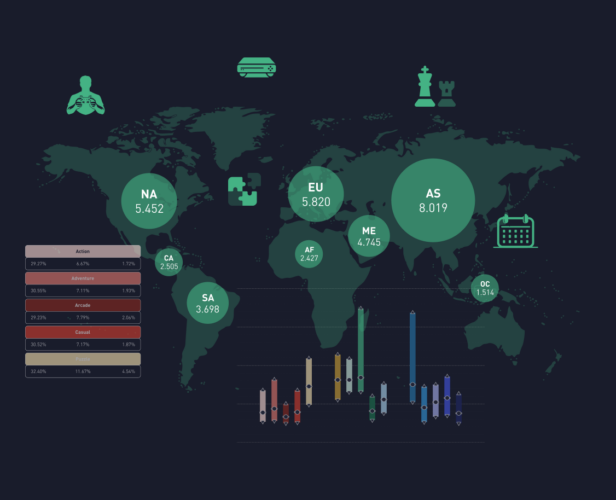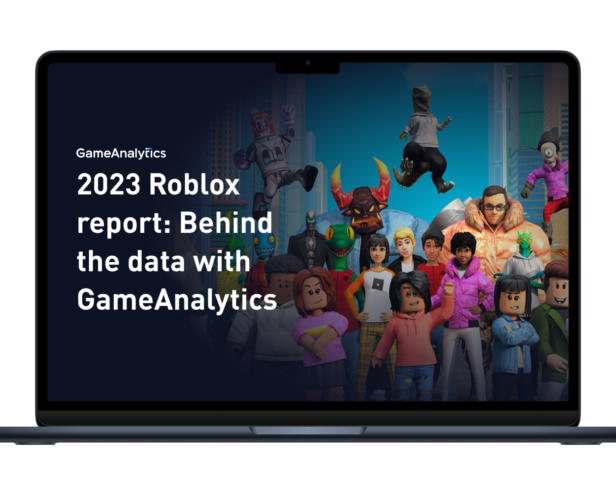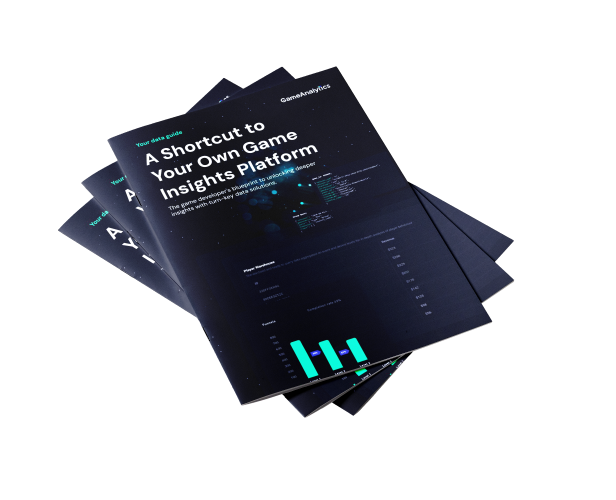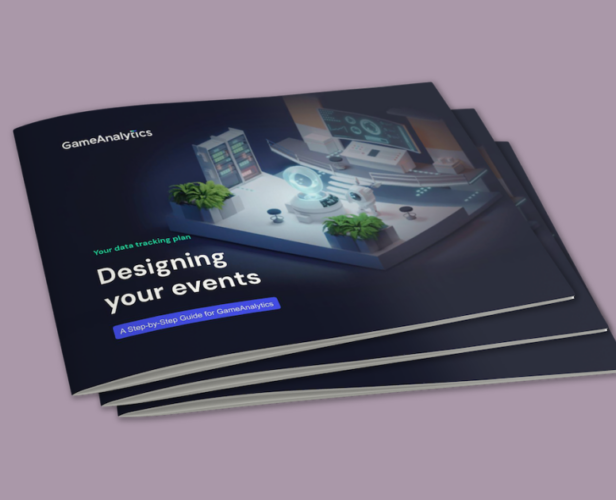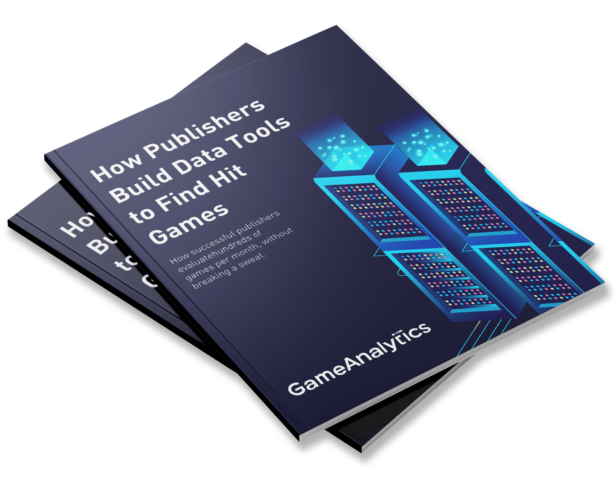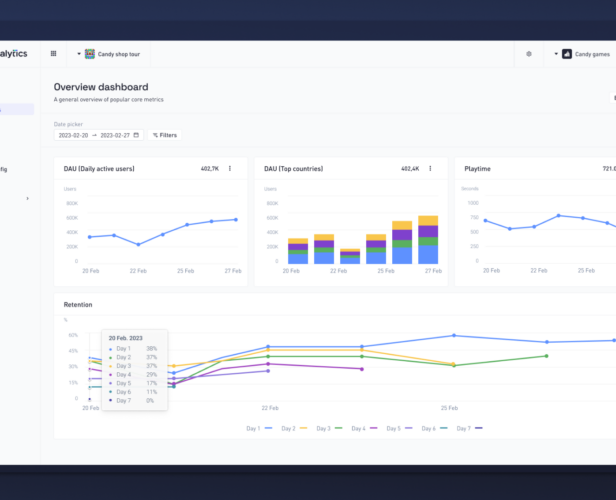Resources > All
Insights and tips about the games industry
Subscribe for gaming insights, industry reports and product updates delivered straight to your inbox.
#Ads & Monetization
Freemium Economics: Commerce at a Price Point of $0
Eric Seufert on Freemium Economics: Leveraging Analytics and User Segmentation to Drive Revenue, his recently published book that covers topics ignored by many product developers, but which ultimately form the crux of the freemium model.
#Game Design
What Is The Compulsion Loop?
Joseph Kim details the compulsion loop concept, expands it with his own interpretation, and describes the potential future opportunity leveraging this concept.
#Data & Analytics
Analysing Auctions: The Case of Glitch
Shawna Baskins, Joseph Riley and Anders Drachen analyse Glitch's in-game economic system, concentrating on the auction house and NPC vendors.
#Data & Analytics
Data is good, but not all data is equally good
Effective data capture is like a sensory system for your game so you can understand the actual behaviour it exhibits rather than what we expect it to do or what focus groups tell us it might do. But can we always trust what the data tells us?
#Ads & Monetization
Mid-Core Success Part 4: Monetization
In the last part of his Mid-Core series, Michail Katkoff talks about why sustained monetization is a result achieved through excellent game design, a balanced game economy, engaging social mechanics and a fresh approach.
#Game Mechanics
Mid-Core Success Part 3: Social
In part three of his Mid-Core Success series, Michail Katkoff talks about true social mechanics, the kind that add to the gameplay, improve overall player experience and make the game feel more alive.
#Data & Analytics
Navigating the hazards of game data
Effective data capture is vital to delivering games as a service. The trouble is how do we know what the data means? How can we be sure we are asking the right questions?
#GameAnalytics Updates
How to use GameAnalytics to validate design decisions
We’re proud to announce that GameAnalytics has just been featured on Gamasutra in Amir Fassihi’s article on “Closing the Loop: Validating Design Decisions Using Player Data for a Platformer”. Amir is the team lead of Dead Mage, the studio behind the popular iOS game Shadowblade. Those of you who feared that tools such as GameAnalytics are only useful for freemium games and monetization tweaks, you should know that Shadowblade is a one time-purchase. Moreover, Dead Mage has been using our tool to fine tune the most trickiest aspects of their game: “Quantitative measurement and feedback has been a main pillar for all disciplines of science for a long time and validation of the design assumptions in every product design is an essential part of the whole design process in many areas. In game development, art and programming are two main aspects that...
#GameAnalytics Updates
Building beautiful games with Corona in a fraction of the time
With the occasion of the official GameAnalytics - Corona SDK partnership, David Rangel, COO at Corona Labs, points out the awesome in their mobile game development platform.
#Game Deconstructions
3 Things Mobile Game Developers Can Learn From Candy Crush
Candy Crush Saga is not only a game of addiction, but one which also constantly has a lot of life lessons to teach game developers everywhere. Kelly Clay, Digital Communications Strategist at HasOffers, points out some of the teachings you shouldn't miss in Candy Crush.
#Data & Analytics
Becoming A Games Analyst
For the first time on the GameAnalytics blog, Roy Hwang suggest what everyone should read before jumping into games analysis. This post outlines the process of becoming a viable games analyst, while also keeping an eye out for the most valuable resources out there.
#Live Ops
Mid-Core Success Part 2: Retention
Michail Katkoff gives tips on how to overcome the challenge of returning players to your game with a well-though core loop, a balanced game economy and clever use of in-game events.
#User Acquisition
Two misconceptions about paid user acquisition
Paid user acquisition has nothing to do with the creative vs. wholly data-driven design debate; paid user acquisition occurs outside of freemium and should always be dictated by economic parameters in pursuit of an optimal revenue outcome.
#Editor's pick
Game data pipeline: Building vs buying
As a large number of studios, publishers, and game developers are heavily relying on data to guide their decisions, they need to decide between building or buying. But which one is more efficient? To assist you in understanding the Total Cost of Ownership (TCO), we broke down the following key considerations: Setup requirements Cost calculation Team needs and recruitment
#Editor's pick
Mobile gaming benchmarks for Q1 2024
Uncover the industry’s performance with Q1 2024 benchmarks. Explore key metrics like retention rates and session engagement to benchmark your games against industry standards. What’s inside? Retention benchmarks for casual, classic, and mid-core games Session length benchmarks for games launched in North America, Europe, the Middle East, and Asia Session count benchmarks across 15 game genres
#Editor's pick
Grow your revenue with Xsolla Web Shop for Mobile Games
“Xsolla anticipated this seismic shift earlier this year, when we launched multiple products that are being actively used by some of the world’s largest game companies to increase profit and build closer relationships with their mobile and pc players. We’ve now combined these products and learnings into an elegant new solution called Xsolla Web Shop for Mobile Games,” said Chris Hewish, President of Xsolla. Through Xsolla Web Shop for Mobile Games, developers can expect significant revenue growth and can reach new players in new geographies previously unavailable to them. This solution solves many challenges developers face; such as discoverability, declining profit margins, lack of control over the user experience, access to localized payment methods, cross game marketing, more efficient user acquisition, effective collaboration with creators and influencers, and much more. Three industry-changing announcements make this opportunity more timely than ever:...
#Editor's pick
2023 Roblox report: Behind the data with GameAnalytics
Download a comprehensive report of Roblox player behavior and game performance based on GameAnalytics data from 2023. This report highlights critical benchmarks and insights to help Roblox creators optimize their games. What’s inside? Devices analysis Players’ daily session frequency Average revenue spent per user Session length and count benchmarks Retention benchmarks Revenue benchmarks
#Editor's pick
The Game Developer’s Handbook to Mastering Data Solutions
Data is the key to success in the ever-evolving landscape of game development. Explore this guide to transform your data into insights using our turn-key data solutions. What’s inside? Our comprehensive guide explores cost-saving strategies and real-world applications for advanced use cases. Learn how to seamlessly integrate data sources, unlock detailed player insights with Player Warehouse, access real-time data with Raw Export, and ensure data privacy compliance.
#Case study
Developing a #1 VR MMO: Ramen VR’s Journey with GameAnalytics
Discover how Ramen VR used data-driven game development to launch "Zenith: The Last City", which became the #1 bestselling game all major VR platforms—including Meta Quest/Rift, Steam and PlayStation VR.
#Editor's pick
Using AI to Supercharge Your Game Art Design
Discover how tweaking AI tool settings can help you generate varied art styles, produce better concepts, and speed up the process from prototype to final design. With AI on your team, creating unique game art has never been easier or faster.
#Editor's pick
Event Design & Tracking Guide for GameAnalytics
Learn how to create an adaptable tracking plan, enabling you to unlock richer insights and maximize the value of your data within GameAnalytics.
#Editor's pick
How studios use DataSuite to find hit games
Learn how successful publishers evaluate hundreds of games per month, to find the next hit game.
#Editor's pick
Among Us VR dev talks about how to create immersive worlds
VR is all about immersion. It’s about allowing players to lose themselves in more than just a game, but a new world. You have to build VR experiences the right way to make this happen. This goal is always top-of-mind for Schell Games. In this interview, we spoke to Schell Games’ Vice President of Product, Charlie Amis, to learn their story. “For VR, you want to make the player feel like they’re actually in the world you’ve created. This isn’t as true or a high priority in PC and console games. If people start to lose that sense of presence and immersion, then a lot of the reason they put the headset on is hurt. They want to go to another world or be someone new. So you need to help them feel like they’re really there and really that...
#Editor's pick
GameAnalytics H1 Update: New Product Improvements!
It’s been a busy time since February, when the largest update in GameAnalytics history was launched. Read on for more information about what’s changed recently, and new functionality coming to the platform very soon.
#Case study
How TapNation uses DataSuite to increase the LTV of 19 hit games by 50% in only 6 months
Smashing obstacles with Giant Rush While they’ve seen huge improvements using DataSuite across their portfolio, one game stands out in particular: Giant Rush. (And not just because the character is huge.) The title has now reached over 140 million downloads. And, through a series of A/B tests and insights from the data they collected, they’ve been able to increase the LTV by a whopping 200% over six months for this specific title. “It’s because we A/B test every day,” Philippe Grazina from TapNation says. “We ask questions like: When are players leaving the game? For example, the boss in Giant Rush. If we spot that they’re leaving at the same point every time, we know we need to make a change. Small details like that really help.” Through these granular insights, TapNation can iterate and improve on their game step...
#Editor's pick
How to Build a Data Warehouse for Games from Scratch
Over our last couple of blogs around data warehouses, we’ve explained how they let you analyze data from across your portfolio and look at what insights you can gather from them. Now, we’ll dive into how to build a data warehouse. What steps do you need to take and what resources will you need? To figure this out, we’ve rounded up the costs, steps, and tools we think you’ll need to get started. Please note, that we haven’t included the cost of running an engineering department (which you’ll need), which can end up being a lot of $$$. What do I need to get started? Before you start, you’ll need to ensure you have the right people. You’ll likely need a software or data engineer, and perhaps an architect or DevOps engineer. You’ll also need to budget for tools like...















